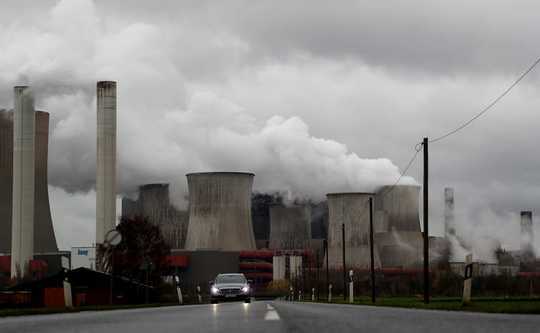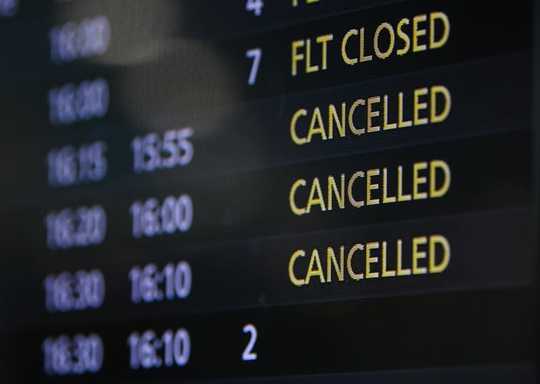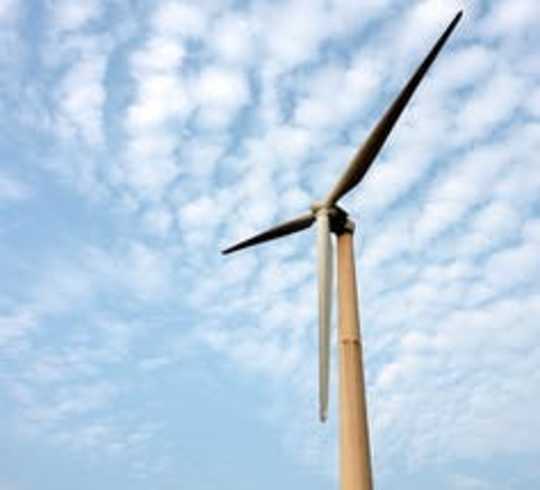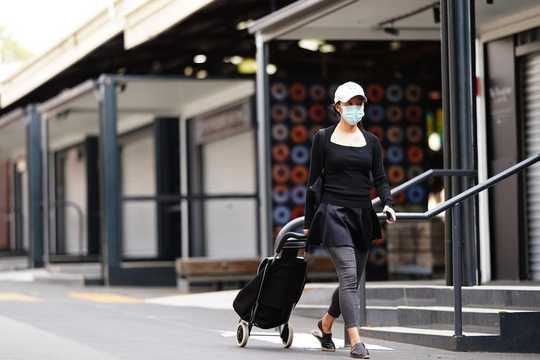 The human ability to adapt to climate change can make it seem less urgent. CHAMILA KARUNARATHNE/EPA
The human ability to adapt to climate change can make it seem less urgent. CHAMILA KARUNARATHNE/EPA
Every aspect of our lives has been affected by the coronavirus. The global economy has slowed, people have retreated to their homes and thousands have died or become seriously ill.
At this frightening stage of the crisis, it’s difficult to focus on anything else. But as the International Agency has said, the effects of coronavirus are likely to be temporary but the other global emergency – climate change – is not.
Stopping the spread of coronavirus is paramount, but climate action must also continue. And we can draw many lessons and opportunities from the current health crisis when tackling planetary warming.
 Action to reduce greenhouse gas emissions must not be compromised by the coronavirus pandemic. EPA/MAST IRHAM
Action to reduce greenhouse gas emissions must not be compromised by the coronavirus pandemic. EPA/MAST IRHAM
A ‘degrowing’ economy
S&P Global Ratings this week said measures to contain COVID-19 have pushed the global economy into recession.
Economic analyst Lauri Myllyvirta estimates the pandemic may have reduced global emissions by 200 megatonnes of carbon dioxide to date, as air travel grinds to a halt, factories close down and energy demand falls.
In the first four weeks of the pandemic, coal consumption in China alone fell by 36%, and oil refining capacity reduced by 34%.
In many ways, what we’re seeing now is a rapid and unplanned version of economic “degrowth” – the transition some academics and activists have for decades said is necessary to address climate change, and leave a habitable planet for future generations.
Degrowth is a proposed slowing of growth in sectors that damage the environment, such as fossil fuel industries, until the economy operates within Earth’s limits. It is a voluntary, planned and equitable transition in developed nations which necessarily involves an increased focus on the environment, human well-being, and capabilities (good health, decent work, education, and a safe and healthy environment).
Such a transformation would be profound, and so far no nation has shown the will to implement it. It would require global economies to “decouple” from carbon to prevent climate-related crises. But the current unintended economic slowdown opens the door to such a transition, which would bring myriad benefits to the climate.
The idea of sustainable degrowth is very different to a recession. It involves scaling back environmentally damaging sectors of the economy, and strengthening others.
 Reduced air travel is helping drive global emissions down. James Gourley/AAP
Reduced air travel is helping drive global emissions down. James Gourley/AAP
A tale of two emergencies
Climate change has been declared a global emergency, yet to date the world has largely failed to address it. In contrast, the global policy response to the coronavirus emergency has been fast and furious.
There are several reasons for this dramatic difference. Climate change is a relatively slow-moving crisis, whereas coronavirus visibly escalates over days, even hours, increasing our perception of the risks involved. One thing that history teaches us about politics and the human condition in times of peril, we often take a “crisis management” approach to dealing with serious threats.
As others have observed, the slow increase in global temperatures means humans can psychologically adjust as the situation worsens, making the problem seem less urgent and meaning people are less willing to accept drastic policy measures.
Key lessons from coronavirus
The global response to the coronavirus crisis shows that governments can take immediate, radical emergency measures, which go beyond purely economic concerns, to protect the well-being of all.
Specifically, there are practical lessons and opportunities we can take away from the coronavirus emergency as we seek to tackle climate change:
Act early: The coronavirus pandemic shows the crucial importance of early action to prevent catastrophic consequences. Governments in Taiwan, South Korea and Singapore acted quickly to implement quarantine and screening measures, and have seen relatively small numbers of infections. Italy, on the other hand, whose government waited too long to act, is now the epicentre of the virus.
Go slow, go local: Coronavirus has forced an immediate scale-down of how we travel and live. People are forging local connections, shopping locally, working from home and limiting consumption to what they need.
Researchers have identified that fears about personal well-being represent a major barrier to political support for the degrowth movement to date. However with social distancing expected to be in place for months, our scaled-down lives may become the “new normal”. Many people may realise that consumption and personal well-being are not inextricably linked.
 Stimulus spending should be directed to clean energy. EPA
Stimulus spending should be directed to clean energy. EPA
New economic thinking is needed. A transition to sustainable degrowth can help. We need to shift global attention from GDP as an indicator of well-being, towards other measures that put people and the environment first, such as New Zealand’s well-being budget, Bhutan’s gross national happiness index, or Ecuador’s social philosophy of buen vivir (good living).
Spend on clean energy: The International Energy Agency (IEA) says clean energy should be “at the heart of stimulus plans to counter the coronavirus crisis”.
The IEA has called on governments to launch sustainable stimulus packages focused on clean energy technologies. It says hydrogen and carbon-capture also need major investment to bring them to scale, which could be helped by the current low interest rates.
Governments could also use coronavirus stimulus packages to reskill workers to service the new “green” economy, and address challenges in healthcare, sanitation, aged care, food security and education.
 More people are shopping locally during the pandemic. AAP/STEFAN POSTLES
More people are shopping locally during the pandemic. AAP/STEFAN POSTLES
Looking ahead
As climate scientist Katharine Hayhoe said this month:
What really matters is the same for all of us. It’s the health and safety of our friends, our family, our loved ones, our communities, our cities and our country. That’s what the coronavirus threatens, and that’s exactly what climate change does, too.
The coronavirus crisis is devastating, but failing to tackle climate change because of the pandemic only compounds the tragedy. Instead, we must draw on the lessons of coronavirus to address the climate challenge.![]()
About The Author
Natasha Chassagne, University Associate, University of Tasmania, University of Tasmania
This article is republished from The Conversation under a Creative Commons license. Read the original article.
Related Books
Drawdown: The Most Comprehensive Plan Ever Proposed to Reverse Global Warming
by Paul Hawken and Tom Steyer In the face of widespread fear and apathy, an international coalition of researchers, professionals, and scientists have come together to offer a set of realistic and bold solutions to climate change. One hundred techniques and practices are described here—some are well known; some you may have never heard of. They range from clean energy to educating girls in lower-income countries to land use practices that pull carbon out of the air. The solutions exist, are economically viable, and communities throughout the world are currently enacting them with skill and determination. Available On Amazon
In the face of widespread fear and apathy, an international coalition of researchers, professionals, and scientists have come together to offer a set of realistic and bold solutions to climate change. One hundred techniques and practices are described here—some are well known; some you may have never heard of. They range from clean energy to educating girls in lower-income countries to land use practices that pull carbon out of the air. The solutions exist, are economically viable, and communities throughout the world are currently enacting them with skill and determination. Available On Amazon
Designing Climate Solutions: A Policy Guide for Low-Carbon Energy
by Hal Harvey, Robbie Orvis, Jeffrey Rissman With the effects of climate change already upon us, the need to cut global greenhouse gas emissions is nothing less than urgent. It’s a daunting challenge, but the technologies and strategies to meet it exist today. A small set of energy policies, designed and implemented well, can put us on the path to a low carbon future. Energy systems are large and complex, so energy policy must be focused and cost-effective. One-size-fits-all approaches simply won’t get the job done. Policymakers need a clear, comprehensive resource that outlines the energy policies that will have the biggest impact on our climate future, and describes how to design these policies well. Available On Amazon
With the effects of climate change already upon us, the need to cut global greenhouse gas emissions is nothing less than urgent. It’s a daunting challenge, but the technologies and strategies to meet it exist today. A small set of energy policies, designed and implemented well, can put us on the path to a low carbon future. Energy systems are large and complex, so energy policy must be focused and cost-effective. One-size-fits-all approaches simply won’t get the job done. Policymakers need a clear, comprehensive resource that outlines the energy policies that will have the biggest impact on our climate future, and describes how to design these policies well. Available On Amazon
This Changes Everything: Capitalism vs. The Climate
by Naomi Klein In This Changes Everything Naomi Klein argues that climate change isn’t just another issue to be neatly filed between taxes and health care. It’s an alarm that calls us to fix an economic system that is already failing us in many ways. Klein meticulously builds the case for how massively reducing our greenhouse emissions is our best chance to simultaneously reduce gaping inequalities, re-imagine our broken democracies, and rebuild our gutted local economies. She exposes the ideological desperation of the climate-change deniers, the messianic delusions of the would-be geoengineers, and the tragic defeatism of too many mainstream green initiatives. And she demonstrates precisely why the market has not—and cannot—fix the climate crisis but will instead make things worse, with ever more extreme and ecologically damaging extraction methods, accompanied by rampant disaster capitalism. Available On Amazon
In This Changes Everything Naomi Klein argues that climate change isn’t just another issue to be neatly filed between taxes and health care. It’s an alarm that calls us to fix an economic system that is already failing us in many ways. Klein meticulously builds the case for how massively reducing our greenhouse emissions is our best chance to simultaneously reduce gaping inequalities, re-imagine our broken democracies, and rebuild our gutted local economies. She exposes the ideological desperation of the climate-change deniers, the messianic delusions of the would-be geoengineers, and the tragic defeatism of too many mainstream green initiatives. And she demonstrates precisely why the market has not—and cannot—fix the climate crisis but will instead make things worse, with ever more extreme and ecologically damaging extraction methods, accompanied by rampant disaster capitalism. Available On Amazon
From The Publisher:
Purchases on Amazon go to defray the cost of bringing you InnerSelf.comelf.com, MightyNatural.com, and ClimateImpactNews.com at no cost and without advertisers that track your browsing habits. Even if you click on a link but don't buy these selected products, anything else you buy in that same visit on Amazon pays us a small commission. There is no additional cost to you, so please contribute to the effort. You can also use this link to use to Amazon at any time so you can help support our efforts.























